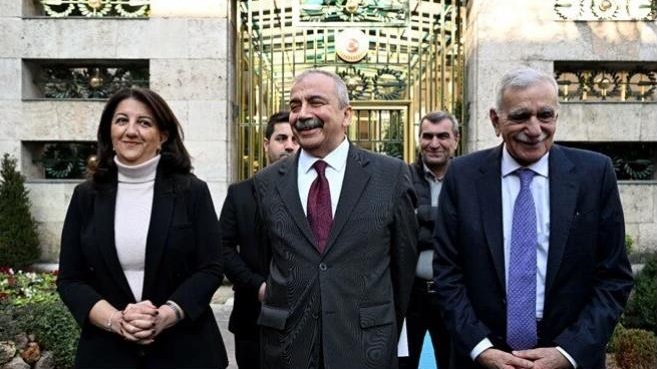Historian Arif Dirlik, who focuses on contemporary Chinese history, explains the Dynamics on Hong Kong protests: What the next chapter might bring is uncertain, to say the least. It is unlikely that a movement that has been in the making for two decades will simply fade away into oblivion.
ARİF DİRLİK*
In 1997, the British government handed Hong Kong over to the People’s Republic of China(PRC) after 150 years of colonial rule. Some observers at the time could not but wonder if Hong Kong would be absorbed and remade by the behemoth to the north, or transform with its proverbial dynamism “the motherland” that already was undergoing radical change. The popular uprising under way in Hong Kong is the most recent indication that the question was not an idle one. The answer is yet to come.
Hong Kong investments and technology played an important part in the 1980s in laying the ground for the PRC’s economic take-off. The “special economic zones” that were set up in Guangdong province at the beginning of “reform and opening” as gateways to global capitalism (while keeping the rest of the country immune to its effects) were intended to take advantage of the dynamic capitalism of neighboring Hong Kong. And they did. To this day, Guangdong leads the rest of the country in industrial production and wealth. It also heavily resembles Hong Kong with which it shares a common language and, despite three decades of separation after 1949, common cultural characteristics. Hong Kong has continued to play a crucial part in the country’s development.
It has been a different matter politically. Since the take-over in 1997 the leadership in Beijing has left no doubt of its enthusiasm for the oligarchic political structure that was already in place before the end of colonial rule, the many freedoms and rule of law Hong Kong people enjoyed were less appealing to a regime that preferred a population obedient to its strictures and a legal system more pliable at the service of Communist Party power. Already in the 1980s, Hong Kong people’s doubts about unification with the “motherland” were obvious in the exodus of those who could afford to leave to places like the United States, Canada and Australia. The exodus speeded up following the Tiananmen tragedy in 1989 which put the rest any hopes that reforms might open up a greater space for political freedoms. The colony practically disqualified itself as any kind of political inspiration for the Mainland with the enthusiastic participation of Hong Kongers in the Tiananmen movement leading up to the June Fourth massacre, and annual commemorations thereafter of the suppression of the student movement. In the early 1990s the Party under Deng Xiaoping settled on the example of Singapore as a model more attuned to its own authoritarian practices.
The same reasons that made the regime suspicious of Hong Kong people for their “lack of patriotism” due to the legacies of colonialism have made Hong Kong into an inspiration as well as a base for radical critics of the regime struggling for greater freedom and democracy on the Mainland. The take-over of 1997 was under the shadow of Tinanmen, but even so few would have imagined at the time that within two decades of the celebrations of the end of colonialism and “return” to the motherland, protestors against Beijing “despotism” would be waving British flags. Once the initial enthusiasm for “liberation” was over, Hong Kongers rediscovered as the source of their “difference” the colonial history which in nationalist historiography appeared as a lapse in the nation’s history, a period of humiliation remembered most importantly to foster nationalist sentiment. PRC democracy activists such as the jailed Nobel Prize winner Liu Xiaobo have drawn the ire of the regime for suggesting that Hong Kong’s freedoms and democratic sentiments were legacies of colonial acculturation that Mainlanders had missed out on.
Current protests have their origins in a consciousness born of the anxieties provoked by the prospect of unification in the 1980s and 1990s, and even though both the Mainland and Hong Kong have changed radically in the intervening period, the Hong Kong identity that assumed recognizable contours at the time is a fundamental driving force of the protests. The immediate issue that has provoked the protests—call for universal suffrage in the selection of the chief executive and legislative council of the Special Administrative Region—harks back to the Basic Law of 1984 agreed upon by the British and the PRC as a condition of unification. The Basic Law stipulated that Hong Kong would be subject internally to its own laws for fifty years after the take-over under a system of “one country, two systems,” with its own chief executive and a legislature elected by an election committee representing various functional constituencies in a corporatist arrangement. The arrangement openly favored the corporate and financial ruling class in Hong Kong which in turn, was prepared to align its interests with those of the Communist regime in a mutually beneficial relationship. The Hong Kong Special Administrative Region (SAR) was something of a political counterpart to the “special economic zones”—an exception that was granted not to compromise national sovereignty but as an act of sovereign power. In all matters pertaining to governance and the law, the SAR would be accountable to the National People’s Congress (NPC) in Beijing. Hong Kong was granted representation in the NPC which, like all representation in that body, has served more to consolidate central control than to allow for the democratic airing of public opinion and grievances.
“One country, two systems” was an unstable structure. It was important to the PRC for patriotic reasons to put an end to the colonialism at its doorstep and retrieve territory lost a century and a half ago. But some compromise with the departing British was unavoidable given the strategic importance to the new project of development of the global corporate and financial hub that was Hong Kong. The autonomy granted to Hong Kong was subject to the good faith of the Beijing government. What might happen if the PRC no longer needed this hub seemed like a remote contingency in the 1980s, but already by the 1990s there was talk of the rise of Shanghai as a competitor. It is not out of the question that the present unrest which may undermine faith in Hong Kong as a corporate and financial center is not entirely undesirable to the regime now that preparations have been completed to launch a new financial center in Shanghai
A similar uncertainty attended the issue of governance under the system. The Basic Law held out the possibility of democratic government and universal suffrage in Hong Kong subject to circumstances to be determined by the NPC. It nourished hopes in democracy, but reserved for Beijing final say on when and how democracy was to be exercised. There were no guarantees that full democracy would be granted if Hong Kongers invited the displeasure of the government in Beijing—or circumstances within the country made it undesirable. This is the immediate issue in the current protests (along with public dissatisfaction with the current chief executive, Leung Chun Ying who, like his two predecessors since 1997, is widely viewed as a Beijing puppet). To Hong Kong democracy advocates, the offer of universal suffrage is a mockery of the promise of full democracy when the choices are limited to candidates carefully selected by an electoral commission packed with Beijing loyalists.
The take-over in 1997, and the circumstances of its negotiation, had one very significant consequence that in likelihood was unanticipated: the politicization of Hong Kong society. Hong Kong long had a reputation as a cultural and political “desert.” The British colonial regime was successful in diverting popular energies to the struggle for everyday existence, and for those who could, the pursuit of wealth. At the height of the Cultural Revolution on the Mainland in 1967, labor disputes erupted into riots against the colonial government led by pro-Beijing leftists. But sustained political activity dates back to the negotiations surrounding the take-over, especially the mobilization instigated by the Tiananmen movement in Beijing. Politics over the last twenty-five years has revolved around the assertion of a Hong Kong identity against dissolution into the PRC. As a new political consciousness has found expression in the efflorescence of a Hong Kong culture in film and literature, the latter has played no little part in stimulating political activity. Ironically, while the goal of “one country, two systems” was to ease Hong Kong into the PRC, the very recognition of the differences of Hong Kong from the rest of the country would seem to have underlined the existence of a Hong Kong identity that differentiated the former colony from the rest of PRC society.
Current protests have focused attention on issues of governance. Far more important are the social tensions and the economic transformations that lend urgency to protestors’ demand for political recognition and rights. One important indication is the part young people—teenagers—have played in the protests. Joshua Wong, who has emerged as a leader, is seventeen years old, which means that he was born in 1997, the year of the take-over.
The generation Wong represents has come of age in a society subject to deepening social and economic problems. The wealth gap in Hong Kong is nothing new, but as elsewhere in the world, inequality has assumed critical proportions with increased concentration of wealth in the hands of the elite allied with Beijing. Since 1997, the experience of marginalization has been intensified with the inundation of the city by Mainlanders with their newfound wealth which has increased prices of commodities, put pressures on public services - including housing, health and education - and introduced new cultural fissures. Some Hong Kong businesses prefer Mainland customers on whose business they have come to be dependent. In the 1990s, Mainlanders living in Hong Kong used to complain about the prejudice they suffered from Hong Kongers with their pretensions to superior cultural sophistication. That has been reversed. Even the most uncouth Mainlanders are likely to look down on Hong Kongers for not being authentically Chinese, which typifies PRC attitudes toward Chinese populations elsewhere. While Hong Kongers complain about “locusts” from the North, a very-un
Confucian Beijing University professor descended from Confucius refers to Hong Kongers as “bastards” contaminated by their colonial past. The central government in Beijing, sharing the suspicious of southerners of its imperial predecessors, is engaged in efforts to discourage the use of Cantonese while instilling in the local population its version of what it means to be “Chinese.” We may recall that the present protests were preceded two years ago by successful protests against Beijing-backed efforts to introduce “patriotic” education to Hong Kong schools. It is not that Hong Kong people are not patriotic. They are very patriotic indeed. But their patriotism is mediated by their Hong Kong identity, a very product of the take-over that Beijing would like to erase.
The upheaval in Hong bears similarities to “Occupy” movements elsewhere in the economic issues that inform it. It also has its roots in the special circumstances of Hong Kong society, and its relationship to Beijing. The movement may be viewed as the latest chapter in a narrative that goes back to the 1980s, the emergence of a neoliberal global capitalism of which the PRC has been an integral component, and the Tiananmen movement which was one of the earliest expressions of the social and political strains created by shifts in the global economy. The demands for democracy in the protests are clearly not merely “political.” Democracy is important to the protestors not only as a means to retrieving some control over their lives, but also to overcome inequality. The authorities in Beijing are quite aware of this link. A Law professor from Tsinghua University in Beijing who also serves as an advisor on Hong Kong affairs just recently announced that democracy would jeopardize the wealthy who are crucial to the welfare of Hong Kong’s capitalist economy. It may seem ironic that a Communist Party should be devoted to the protection of wealthy capitalists, but that is the reality of contemporary PRC society that the protestors are struggling against.
The protests are also the latest chapter in the formation of a Hong Kong identity which assumed urgency with the prospect of return to the “motherland” in the 1980s. This, too, is a threat to a regime in flux that finds itself threatened by identity claims among the populations it rules over. It seems superfluous to say that allowing to the people of Hong Kong the self-rule they demand would have adverse consequences in encouraging separatism among the various ethnic groups already in rebellion against the regime, and further stimulate democracy activists among the Han population. Hitherto pro-Beijing Guomindang leader in Taiwan, Ma Ying-jeou, has recently voiced his opposition to unification under the “one country, two-systems” formula.
It would probably take something of a miracle for the protest movement in Hong Kong to achieve its stated goals. Rather than risk a Tiananmen style confrontation, the authorities have taken a wait-and-see attitude, waiting for the movement to spend its force, or opponents to force it to retreat. There are signs already that the movement has run its course in clashes between the protestors and members of the general public weary of the disruption of life and business. It is suspected that the attackers included members of Triad gangs. Whom they might be serving is, for the moment, anybody’s guess.
What the next chapter might bring is uncertain, to say the least. It is unlikely that a movement that has been in the making for two decades will simply fade away into oblivion. The problems it set out to resolve are very real, and offer little sign of resolution, and the movement has proven its resilience through the years. The distinguished scholar of Hong Kong-Mainland relations at the City University of Hong Kong, Joseph Cheng Yu-shek,who is also an advocate of democracy, stated in a recent interview that. '“All the protesters here and Hong Kong people know it is extremely unlikely the Chinese leaders will respond to our demands….“We are here to say we are not going to give up, we will continue to fight on. We are here because as long as we fight on, at least we haven’t lost.”
*Independent scholar, Eugene, OR





